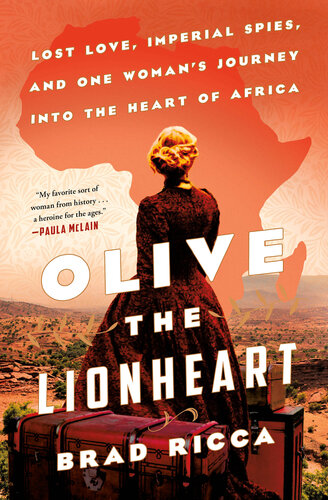
Olive the Lionheart
Lost Love, Imperial Spies, and One Woman's Journey into the Heart of Africa
کتاب های مرتبط
- اطلاعات
- نقد و بررسی
- دیدگاه کاربران
نقد و بررسی

May 11, 2020
Biographer Ricca (Mrs. Sherlock Holmes) delivers an illuminating portrait of Scottish aristocrat Olive MacLeod, who set out in 1910, at age 30, to find her fiancé, the naturalist Boyd Alexander, after he went missing in Africa. Drawing extensively from MacLeod’s own diaries and letters, Ricca recreates her journey, in the company of a married couple who were more seasoned travelers, across 3,700 miles in nine months, as the trio encountered snakes, crocodiles, magic men, and sand storms, as well as the tensions between German, French, and British colonial forces that contributed to Boyd’s killing. Along the way, MacLeod discovered the Mao Kabi Falls (renamed MacLeod Falls), crossed Lake Chad in a canoe, and ascended the Hajer-el-Hamis peaks barefoot, becoming a noted explorer, archaeologist, and photographer in her own right. MacLeod’s diary, which notes, among other colorful details, the numerous times villagers who’d never seen a white woman begged her to let down her ankle-length red hair, is a remarkable resource, and Ricca makes the most of it, while also enriching the narrative with helpful insights into the era’s political, cultural, and social tensions. Fans of women’s history and adventure stories will cheer this engrossing account.

May 15, 2020
Intriguing tale of a young Scottish woman who traveled to Africa to find her lost fiance. Cleveland-based author Ricca clearly relishes the discovery of strange, off-the-beaten-path stories. While researching Dunvegan Castle on the Isle of Skye, he managed to secure the heretofore undisclosed diaries of Olive MacLeod (1880-1936), a Scottish aristocrat who was distraught when she learned that her fiance, naturalist and adventurer Boyd Alexander, had disappeared in West Africa in 1910. Letting his subject "tell [the story] herself" while avoiding the temptation to "reach in from the future and fix things," the author engagingly re-creates her relationship with Alexander and determination to find him when he went missing. MacLeod met the dashing explorer on an outing in Kent in the summer of 1908; she was much taken by his stories of danger and intrigue, and he was fascinated by her quick mind and liveliness. Alexander had lost his brother on a previous expedition, and he sought to return to Africa for "unfinished business." Before he left in December, he remarked, "once one is a marked man one is not allowed to stop....I don't suppose I shall get any rest till I leave my bones in Africa." Through their correspondence, interspersed throughout, we learn that she first declined to marry him and then changed her mind. In a sometimes elliptical narrative, Ricca tracks MacLeod's African trek in the company of the Talbots, friends and fellow traveling companions of Alexander's whom the author also fleshes out. They ventured through Nigeria, Chad, and elsewhere, meeting native tribes, facing dangerous wildlife; eventually, they arrived in Maifoni, where MacLeod learned the sad truth about her fiance. Some readers may become slightly disoriented by the abrupt switches in time, but the author successfully conveys the powerful, nearly hallucinatory state of grief that MacLeod must have endured over the course of her journey. A swift-moving re-creation of an intrepid, rare spirit of her age.
COPYRIGHT(2020) Kirkus Reviews, ALL RIGHTS RESERVED.

June 1, 2020
Olive Macleod (1880-1936) was the scion of an ancient Scottish clan, with its own family castle on the Isle of Skye. Her life was already a storybook affair when her fianc�, the naturalist Boyd Alexander, disappeared on an African expedition. Then Olive went to find him, and the story gets even better. Ricca's (Mrs. Sherlock Holmes, 2017) account of Macleod's great adventure, told from her perspective, draws from her books, diaries, and family documents to re-create her daunting, 3,700-mile trek into an uncharted part of central Africa. She encountered unparalleled natural beauty, abundant wildlife, and extreme weather. She met Africans living as they had for hundreds of years, and she wrestled with officials disinclined to tell the truth about Alexander's death. Though the narrative wanders a bit, Ricca makes the most of this engaging story. He writes evenhandedly about colonial British rule and the cruelties Macleod witnessed among some African tribes. Macleod's Victorian sentimentality at times cloaks her standing as a woman with grit and courage to spare. But her story speaks for itself, and it is one for the books.(Reprinted with permission of Booklist, copyright 2020, American Library Association.)

























دیدگاه کاربران